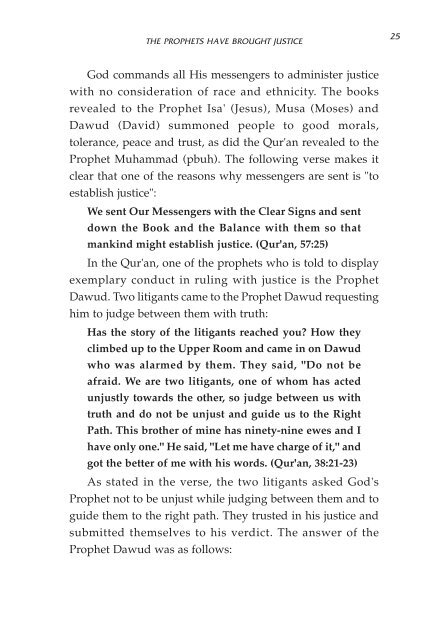Create successful ePaper yourself
Turn your PDF publications into a flip-book with our unique Google optimized e-Paper software.
THE PROPHETS HAVE BROUGHT JUSTICE<br />
25<br />
God comm<strong><strong>an</strong>d</strong>s all His messengers to adm<strong>in</strong>ister justice<br />
with no consideration of race <strong><strong>an</strong>d</strong> ethnicity. The books<br />
revealed to <strong>the</strong> Prophet Isa' (Jesus), Musa (Moses) <strong><strong>an</strong>d</strong><br />
Dawud (David) summoned people to good morals,<br />
toler<strong>an</strong>ce, peace <strong><strong>an</strong>d</strong> trust, as did <strong>the</strong> Qur'<strong>an</strong> revealed to <strong>the</strong><br />
Prophet Muhammad (pbuh). The follow<strong>in</strong>g verse makes it<br />
clear that one of <strong>the</strong> reasons why messengers are sent is "to<br />
establish justice":<br />
We sent Our Messengers with <strong>the</strong> Clear Signs <strong><strong>an</strong>d</strong> sent<br />
down <strong>the</strong> Book <strong><strong>an</strong>d</strong> <strong>the</strong> Bal<strong>an</strong>ce with <strong>the</strong>m so that<br />
m<strong>an</strong>k<strong>in</strong>d might establish justice. (Qur'<strong>an</strong>, 57:25)<br />
In <strong>the</strong> Qur'<strong>an</strong>, one of <strong>the</strong> prophets who is told to display<br />
exemplary conduct <strong>in</strong> rul<strong>in</strong>g with justice is <strong>the</strong> Prophet<br />
Dawud. Two litig<strong>an</strong>ts came to <strong>the</strong> Prophet Dawud request<strong>in</strong>g<br />
him to judge between <strong>the</strong>m with truth:<br />
Has <strong>the</strong> story of <strong>the</strong> litig<strong>an</strong>ts reached you? How <strong>the</strong>y<br />
climbed up to <strong>the</strong> Upper Room <strong><strong>an</strong>d</strong> came <strong>in</strong> on Dawud<br />
who was alarmed by <strong>the</strong>m. They said, "Do not be<br />
afraid. We are two litig<strong>an</strong>ts, one of whom has acted<br />
unjustly towards <strong>the</strong> o<strong>the</strong>r, so judge between us with<br />
truth <strong><strong>an</strong>d</strong> do not be unjust <strong><strong>an</strong>d</strong> guide us to <strong>the</strong> Right<br />
Path. This bro<strong>the</strong>r of m<strong>in</strong>e has n<strong>in</strong>ety-n<strong>in</strong>e ewes <strong><strong>an</strong>d</strong> I<br />
have only one." He said, "Let me have charge of it," <strong><strong>an</strong>d</strong><br />
got <strong>the</strong> better of me with his words. (Qur'<strong>an</strong>, 38:21-23)<br />
As stated <strong>in</strong> <strong>the</strong> verse, <strong>the</strong> two litig<strong>an</strong>ts asked God's<br />
Prophet not to be unjust while judg<strong>in</strong>g between <strong>the</strong>m <strong><strong>an</strong>d</strong> to<br />
guide <strong>the</strong>m to <strong>the</strong> right path. They trusted <strong>in</strong> his justice <strong><strong>an</strong>d</strong><br />
submitted <strong>the</strong>mselves to his verdict. The <strong>an</strong>swer of <strong>the</strong><br />
Prophet Dawud was as follows:










![Genki - An Integrated Course in Elementary Japanese II [Second Edition] (2011), WITH PDF BOOKMARKS!](https://img.yumpu.com/58322134/1/180x260/genki-an-integrated-course-in-elementary-japanese-ii-second-edition-2011-with-pdf-bookmarks.jpg?quality=85)
![Genki - An Integrated Course in Elementary Japanese I [Second Edition] (2011), WITH PDF BOOKMARKS!](https://img.yumpu.com/58322120/1/182x260/genki-an-integrated-course-in-elementary-japanese-i-second-edition-2011-with-pdf-bookmarks.jpg?quality=85)





